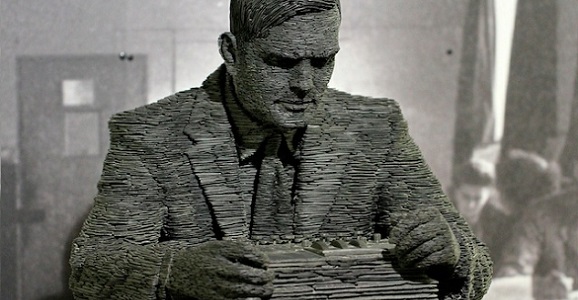Code Breaker Alan Turning To Receive A Posthumous Pardon For His Homosexual Conviction
This article is more than 2 years old
 Admittedly, we’re getting to this story a little later than we should have. It broke a little over a week ago, but given the subject matter, it’s a fitting move, and has allowed for initial feelings to settle down, and others have taken over. Genius codebreaker and war hero Alan TuringAlan Turing may see a posthumous pardon from the British government for his 1952 conviction after he admitted to a physical same-sex relationship. This announcement came mere days after gay marriage rights were granted by the Queen. I think equal rights for all people should have been inherently obvious from the first time legal “rights” became an issue in relatively modern times in the life of man, but I understand that things haven’t always been this way, and that we can’t change history.
Admittedly, we’re getting to this story a little later than we should have. It broke a little over a week ago, but given the subject matter, it’s a fitting move, and has allowed for initial feelings to settle down, and others have taken over. Genius codebreaker and war hero Alan TuringAlan Turing may see a posthumous pardon from the British government for his 1952 conviction after he admitted to a physical same-sex relationship. This announcement came mere days after gay marriage rights were granted by the Queen. I think equal rights for all people should have been inherently obvious from the first time legal “rights” became an issue in relatively modern times in the life of man, but I understand that things haven’t always been this way, and that we can’t change history.
As an armchair fan of Turing and his wartime, and computational, contributions that make our current way of life possible, I was at first pleased to hear this news. It’s always nice to see a little less persecution in the world, and it’s one of the rare instances where a government implies that it may have impacted science in a negative way. But while it’s certainly a victory for the Turing family, but it’s kind of a glove-slap in the face to every other man who suffered for breaking the same laws. As a one-off incident, it’s a strange example to put forth, but as a precedent, it could open a floodgate of back-ended apologetic pardons and legal reneging that reflects current points-of-view. (Anyone caught dancing in Bomont pre-1984, take notes.)
There are two strong aspects to Turing’s case that stand out more than others where public opinion is concerned. First, is the actual crime that Turing committed. In reporting a burglary at his home, Turing lied to cover up a sexual relationship with another man, and when he was caught in the fib, he went overboard, recalling many details of their bedroom endeavors in a written admission. The law in England at the time wasn’t particularly prohibitive of the romantic practice of homosexuality, but “gross indecency” statutes prohibited the physical contact between two male persons. It’s a very fine, faux-liberal line to be sure, but it’s one that Turing crossed in strides with his confession, leaving no gray area for the courtroom.
The second detail that has colored many people’s views of Turing is his eventual suicide. Following his arrest, he was subject to things like injections of female hormones to cancel out his sexual urges, which led to depression, and in 1954 he took his own life by eating a cyanide-laced apple. In the last year or so, there has been some opposition to the suicide ruling. Some claim that Turing was not depressed prior to his death, and that it’s much more likely his work-related proximity to cyanide, combined with a habit of classifying chemicals by tasting them, led to an accidental death. Now, that view isn’t necessarily true, but it definitely paints Turing, who was still at the height of his intelligence, in a different light.
Correcting someone’s cause of death is a vastly different matter than admitting the legal standard at the time was incorrect. Even though I’m underqualified to say whether a judgment call like Turing’s pardon is right or wrong, I’m wary of a possible domino effect that could occur, while acknowledging the positive effect that people think this ruling might have. Maybe I’m just being cynical. Nobody ask Orson Scott Card his opinion.
You readers are a vocal bunch, with strong opinions about social issues. Sound off in the comments on which side you stand on. Writing in German code is not permitted.












